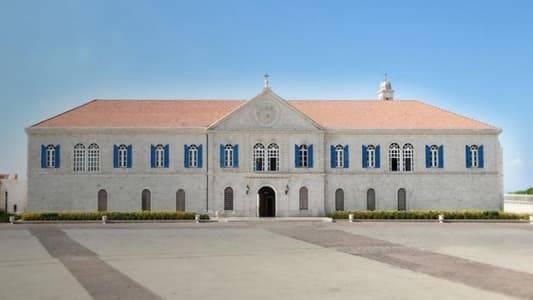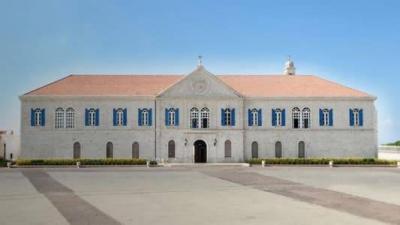The postponement of the parliamentary meeting that was supposed to take place in Bkerke (the seat of the Maronite Church) shifted the real discussion in Beirut from the presidential file to internal Christian relations and placed the presidency in a context of tension among Christian forces and the Church. While there are multiple dimensions contributing to this meeting's postponement, it may represent a point for those opposing a purely Christian gathering in Bkerke, fearing that it would frame the disagreement as a Christian issue, even though the conflict over the presidency is between the opposition and Hezbollah and its allies in the March 8 Forces.
Since efforts began to gather Christian MPs in Bkerke, the influential role that the Church has always played regarding the presidency has been invoked, with the Church remaining committed to asserting the presidency's reference without delving into the details of this entitlement. Even in its modern history, this principle has proven stronger than any political blackmail exerted by any party on Bkerke. Although the Maronite character of the site requires the Church to engage with the presidency from a Maronite perspective, this has not occurred, and Bkerke has treated the event as a national one, involving all sects and political references, reiterating principled stances against delaying elections and insisting on holding them based on national principles that uphold Lebanon's independence, sovereignty, and freedom.
Before President Michel Aoun's term ended, the Maronite Patriarchate emphasized the necessity of conducting elections on time, calling for dialogues to agree on a new president. Once the term ended without electing Aoun's successor, it elevated its role as a national reference and the foremost Maronite reference religiously, seeking to overcome obstacles in the way of this entitlement.
Patriarch Mar Bechara Boutros al-Rahi, after his election, was the one who sponsored the Quadruple Meeting of Maronite leaders that resulted in the idea of a strong and more representative president, which was later translated through the Maarab Agreement that led to Aoun's election as president on October 31, 2016. Since the dialogue ideas around the presidency emerged in recent weeks, all eyes have been on Bkerke to see what it could do in this entitlement beyond the weekly calls by al-Rahi for the election of a president.
Al-Rahi initiated initial moves by receiving the head of the "Free Patriotic Movement," MP Gebran Bassil, and the head of the "Mard" Movement, former minister Sleiman Frangieh. However, prior to this, Bassil visited Bkerke while conducting internal rounds to launch the dialogue idea to agree on a name for the prospective president. From the very beginning, Bassil favored a role for the Maronite Church and encouraged it to repeat the experience of the Quadruple Meeting. The "Mard" Movement was not far from accepting this dialogue under Bkerke's auspices, but Frangieh and Bassil had different goals from the meeting, as the leader of the "Free Movement" was starting from his rejection of the "Mard" leader, while the latter sought backing from Hezbollah and Speaker Nabih Berri as an alleged presidential candidate, even if he had not yet reached the needed 65 votes.
Although Bassil has yet to announce his candidacy, he hinted at it, which seemed to be a signal to Hezbollah. He wanted the meeting to secure Christian cover for his dialogue movement. During this time, Bkerke was opening its doors to many to propose ideas and initiatives in hopes of coming up with any practical suggestion to energize the presidential dialogue. Based on this premise, the idea of holding a broad dialogue meeting for Christian MPs at the Maronite Church's headquarters was proposed to formulate a solution for the presidency. Therefore, al-Rahi suggested convening a meeting of Catholic and Orthodox patriarchs to obtain their authorization for the parliamentary initiative.
As soon as this idea was proposed, remembrance was drawn to the events of 1988 when the late Patriarch Mar Nasrallah Boutros Sfeir called for parliamentary meetings in Bkerke preceding the end of President Amin Gemayel's term. A series of meetings were held among Christian MPs at that time, coinciding with an American request for the Church to provide a list of acceptable presidential candidates. That period was marked by Sfeir's clear stance opposing any agreement between Washington and Syria regarding naming a pro-Damascus president. However, he was compelled to provide a list of candidates, as he later did in 2007 at the French request. In both cases, the list was not adopted, and Lebanon fell into an open presidential crisis. The distinctive feature of those meetings was that they were open to diverse parliamentary trends, accompanying the end of Gemayel's term in all its details and his last visit to Damascus, while also laying the foundation for the Taif Agreement and Bkerke's role—alongside the MPs elected in 1972—in reaching it.
It is impossible to replicate the experience of Sfeir's meetings with MPs back then by holding parliamentary meetings in Bkerke today to agree on a new president. The circumstances are entirely different, as are the local and external players. Currently, Hezbollah and its allies stand against any candidate who "betrays the resistance," as articulated by the party's MPs and officials. This indicates that the party has already identified its candidate, even if it calls for consensus around its desired choice. In contrast, during a visit by a Hezbollah delegation to Bkerke, the presidential file was placed in the hands of the patriarch, meaning that Christians must agree on a single candidate. This cannot be achieved at the moment, and Hezbollah is fully aware of that.
Hence, the Lebanese Forces' fear, during a delegation's visit to Patriarch al-Rahi, of holding a broad parliamentary meeting in Bkerke that yields no results, which would practically mean that Christians failed to agree on a single candidate, thus placing the blame for failure on the Church while exonerating the other parties. Frangieh desires consensus on him from the Bkerke meeting, while Bassil seeks Christian cover for his dialogue activity and ensuring Frangieh's rejection, in the presence of the "Lebanese Forces" and "Kataeb," both of which oppose electing the "Mard" leader.
Thus, the meeting was pre-destined to fail since the "Lebanese Forces" and "Kataeb" have not abandoned their candidate, MP Michel Moawad. The "Lebanese Forces" explicitly announced their stance that a meeting without a mechanism would mean inevitable failure, and the mechanism they propose—abiding by what the majority decides at the meeting—is not acceptable to Frangieh or Bassil, both of whom believe that Moawad would secure a majority of the Christian votes and prefer to hold a clear quadruple meeting.
In conclusion, the parliamentary meeting did not occur, and no new date has been set amidst divergent opinions among the four Christian leaders, who represent the parliamentary blocs that al-Rahi called to meet in Bkerke, along with some independents, returning the Christian dialogue to square one: no Christian agreement to hold internal dialogues, and the Maronite Church is unable to breach the publicly declared stances of the four leaders.




